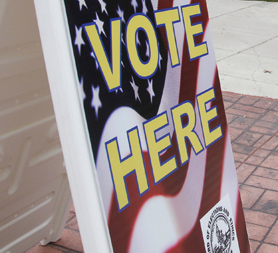US midterms: is Barack Obama to blame?
A Republican rout is expected at tomorrow’s US midterm elections. But is that a rebuke from the electorate for President Barack Obama? Felicity Spector looks at the numbers.

When America goes to the polls tomorrow, voters look set to return more Republicans to Congress than at any time in the last eighty years. That’s a pretty big rebuke for President Obama – or is it?
Look more closely at the numbers (and these are still only polls, don’t forget – so always subject to a margin of error) – and there’s a more complicated story.
First up, the headline figures. This year’s midterms are expected to produce a Republican rout.
According to the latest Gallup poll of 1,539 likely voters – the GOP has built up a commanding lead. Their survey predicts Republican control of the House of Representatives is “highly likely” – the party needs 39 seats to take over, and Gallup says their gains could be “anywhere from 60 seats on up”.
Channel 4 News Special Report on President Barack Obama's first two years in office
37 seats in the Senate are up for election this year: Rasmussen Reports predicts the Republicans will pick up 25 of them. That would not give them a lead in the upper house – but, cautions Rasmussen, the Democrats will still need to win close races in West Virginia, Washington state and California to protect their majority.
Democratic Governors across the country are in danger too: six of them look certain to lose their seats, as white working class voters who supported Hillary Clinton against Barack Obama in the Democratic primaries in 2008 show every intention of switching parties this time.
And if the people clamoured for change back in 2008 – they’re demanding it again now – albeit a rather different kind of change.
Voters want ‘change’ in how Obama leads country
A poll for NBC and the Wall Street Journal says almost two thirds of voters (and interestingly, around half of Democrats) want to see a significant change in the way President Obama has been leading the country.
Most independent voters who say they’ll vote Republican want a divided Government – rather than one party in charge of both the White House and Congress. Mark Penn, Hillary Clinton’s former pollster, said his research showed “independents are largely coming to the side of the Republican party and are extremely dissatisfied with Congress.”
And there’s a whole host of other evidence showing that if you think President Obama is unpopular – just look at what people think of Congressional performance. It’s not pretty. In fact Obama’s own ratings have held pretty steady at around 45% for the last year – no worse than either Bill Clinton or Ronald Reagan at this stage of their first term – while it’s Capitol Hill that’s crashed through the floor. Blame anyone for the Democratic disaster tomorrow – and perhaps it should be the likes of Harry Reid and Nancy Pelosi rather than Obama himself.
A vote against the party in power
Of course whatever the perceived wave of anger against established politicians, and some expected high profile upsets – most incumbents will be returned to office. And many experts caution that rather than a huge conversion towards conservative values, this is more like a vote against the party in power – which typically happens when the economic situation is bad.
But the pundits, says the New York Times psephological guru Nate Silver, are running out of words to describe what the Democrats will wake up to on Wednesday – a hurricane, a tsunami, an earthquake, a meteor strike…. “The Democrats knew it was going to be bad”, he said. “But not this bad.”
So the President must take the blame for this much at least: the gaping “enthusiasm gap” that means so many Democratic supporters simply won’t bother to show up at the polls.
Narrative oblivion
Whether it’s been a mixed message, an elitist message, or no clear message at all – Obama has signally failed to sell his agenda to the nation. The man whose own personal narrative was so compelling has consigned his first two years in office into narrative oblivion.
The Pew Research Center has predicted that this year the non voters will outnumber the voters – and those staying at home are typically younger, less educated, less affluent – and more liberal than those who will be turning out.
So the outcome of these crucial midterms looks set to be determined not just by flip-flopping independents – but those who aren’t going to vote at all.
Felicity Spector is a chief sub-editor with Channel 4 News.